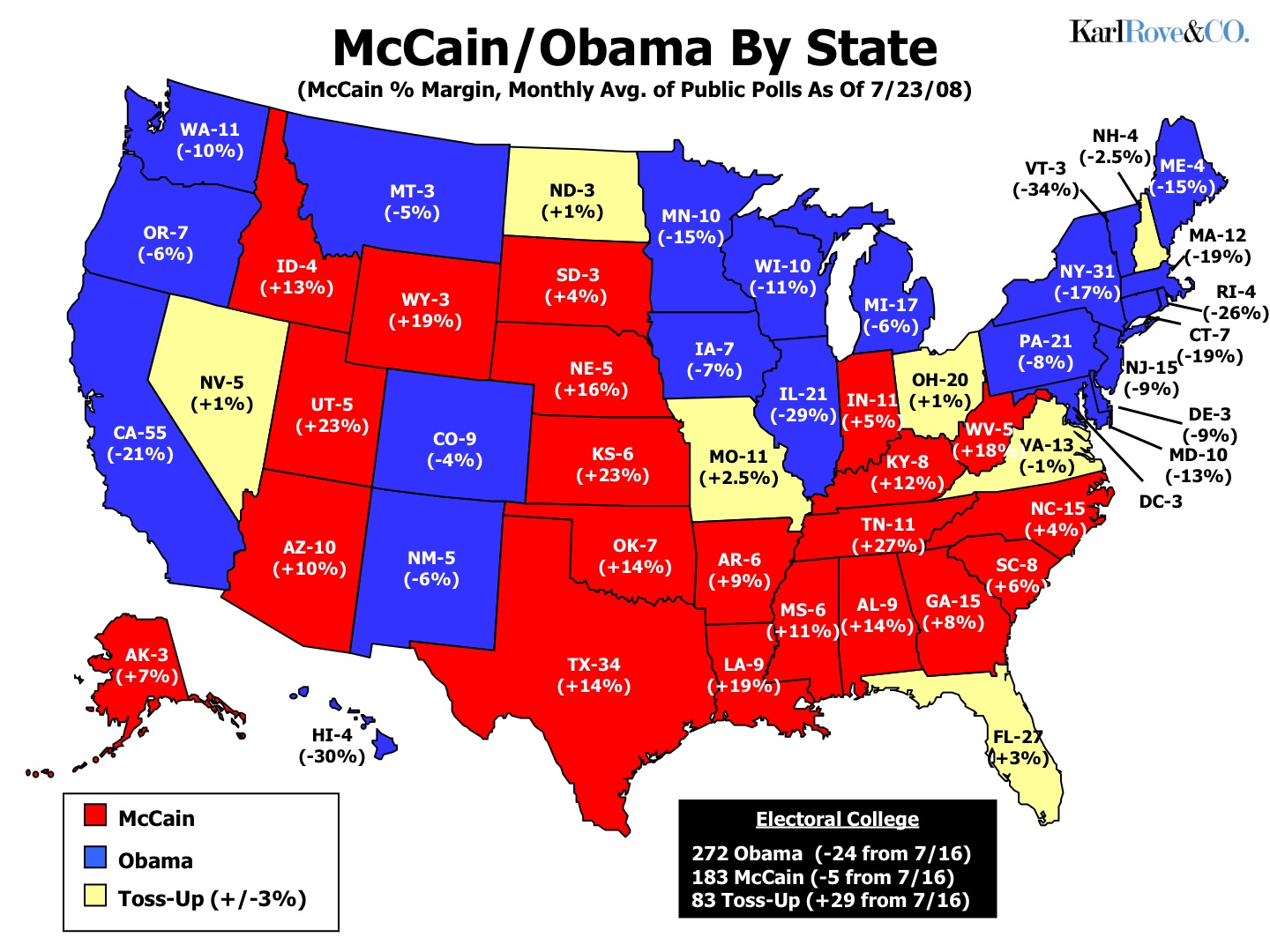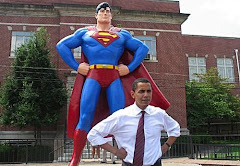
Barack Obama has been compared to Abraham Lincoln by many historians, pundits, personalities, and ordinary citizens. One website encourages the reader who compares Barack Obama to Abraham Lincoln to "tread lightly... but tread" nonetheless. I invite you to tread with me upon these fertile grounds (especially since every Republican baselessly compares himself to Reagan and every Democrat--plus Dan Quayle (haha)--wants to be the next JFK). In most cases, the appropriate response to these silly comparisons of mediocre politicians to great historical figures is some variation of: "Senator, you are no Jack Kennedy."
But this comparison of Barack Obama and Abraham Lincoln is different than these baseless ones, and here's why:
 Lincoln and Obama herald from the great state of Illinois; both were lawyers, criticized for their lack of "experience" to be President (Abe: 8 yrs in IL House of Reps + 2yrs in US House of Reps; Barack: 8 yrs in IL Senate + 2 yrs in US Senate). Each was seeking his party's nomination, running against a Senator from New York (Obama vs. Clinton; Lincoln vs. Seward). Neither had a strong early relationship with his father, and both were self-made men, viewed with skepticism by the Washington elite. According to historian, critic, and columnist Gary Wills (read the full article):
Lincoln and Obama herald from the great state of Illinois; both were lawyers, criticized for their lack of "experience" to be President (Abe: 8 yrs in IL House of Reps + 2yrs in US House of Reps; Barack: 8 yrs in IL Senate + 2 yrs in US Senate). Each was seeking his party's nomination, running against a Senator from New York (Obama vs. Clinton; Lincoln vs. Seward). Neither had a strong early relationship with his father, and both were self-made men, viewed with skepticism by the Washington elite. According to historian, critic, and columnist Gary Wills (read the full article):Neither man fit the conventions of a statesman in his era. Lincoln, thin, gangling, and unkempt, was considered a backwoods rube, born in the frontier conditions of Kentucky, estranged from his father, limited to a catch-as-catch-can education. He was better known as a prairie raconteur than as a legal theorist or prose stylist. Obama, of mixed race and foreign upbringing, had barely known his father, and looked suspiciously "different."
 Both Barack Obama and Abraham Lincoln each gave important speeches that focused on the similarities of the American people, which vastly outweigh any differences that might on the surface appear to be deeply divisive. "We are not as divided as our politics suggest" says Barack in reference to "red" and "blue" states: "There are no red states and blue states; There is the UNITED States!" (Obama: Democratic Convention 2004; Natl Constitution Center 2008). During Lincoln's time, the divisions were not red and blue, but north and south. In his speeches, Lincoln focused on people's common interests and ideals , rather than their differences (Cooper Union 1860).
Both Barack Obama and Abraham Lincoln each gave important speeches that focused on the similarities of the American people, which vastly outweigh any differences that might on the surface appear to be deeply divisive. "We are not as divided as our politics suggest" says Barack in reference to "red" and "blue" states: "There are no red states and blue states; There is the UNITED States!" (Obama: Democratic Convention 2004; Natl Constitution Center 2008). During Lincoln's time, the divisions were not red and blue, but north and south. In his speeches, Lincoln focused on people's common interests and ideals , rather than their differences (Cooper Union 1860).Barack Obama's gave a speech titled, "A More Perfect Union" at the National Constitution Center in Philadelphia in March of 2008.
We cannot solve the challenges of our time unless we solve them together, unless we perfect our union.
We may have different stories, but we have common hopes.
Gary Wills concluded:
But what is of lasting interest is their similar strategy for meeting the charge of extremism. Both argued against the politics of fear. Neither denied the darker aspects of our history, yet they held out hope for what Lincoln called here the better "lights of current experience"—what he would later call the "better angels of our nature." Each looked for larger patterns under the surface bitternesses of their day. Each forged a moral position that rose above the occasions for their speaking.In Lincoln's most famous speech, he invoked a biblical passage:
"A house divided against itself cannot stand." I believe this government cannot endure permanently half slave and half free. I do not expect the Union to be dissolved; I do not expect the house to fall; but I do expect it will cease to be divided.Barack Obama announced his candidacy for President at the Old State Capitol building where Abraham Lincoln delivered his famous "House Divided" speech in 1858
It was here, in Springfield, where North, South, East and West come together that I was reminded of the essential decency of the American people -- where I came to believe that through this decency, we can build a more hopeful America.Obama concluded his speech:
And that is why, in the shadow of the Old State Capitol, where Lincoln once called on a divided house to stand together, where common hopes and common dreams still, I stand before you today to announce my candidacy for President of the United States....
Each and every time, a new generation has risen up and done what's needed to be done. Today we are called once more -- and it is time for our generation to answer that call.
For that is our unyielding faith -- that in the face of impossible odds, people who love their country can change it.
That's what Abraham Lincoln understood. He had his doubts. He had his defeats. He had his setbacks. But through his will and his words, he moved a nation and helped free a people. It is because of the millions who rallied to his cause that we are no longer divided, North and South, slave and free. It is because men and women of every race, from every walk of life, continued to march for freedom long after Lincoln was laid to rest, that today we have the chance to face the challenges of this millennium together, as one people -- as Americans.
By ourselves, this change will not happen. Divided, we are bound to fail.The most important character element and ideology that Obama and Lincoln share is an understanding that we are one nation, one people, and that what seperates us is not nearly as profound as our common hopes, dreams, and values. Lincoln and Obama display the committment to bringing their "enemies" to the table. Lincoln famously filled his cabinet with his most vocal critics, and obviously he took an unpopular stand against the secession of the South.
But the life of a tall, gangly, self-made Springfield lawyer tells us that a different future is possible.
He tells us that there is power in words.
He tells us that there is power in conviction.
That beneath all the differences of race and region, faith and station, we are one people.
He tells us that there is power in hope.
As Lincoln organized the forces arrayed against slavery, he was heard to say: "Of strange, discordant, and even hostile elements, we gathered from the four winds, and formed and fought to battle through."
Barack Obama actively seeks the opinions, council, and collaboration of those whom at first glance would appear to be "enemies" or "critics." He has demonstrated time and time again how important it is to create bipartisan coalitions, and he has effectively created opportunities for collaboration among disperate elements by highlighting the benefits for each participating member to help everyone "buy in" to the process.
 Obviously, America was more explicitly divided during Lincoln's times (states are not threatening to secede in 2008). However, these modern times bring new kinds of divisions that are more nuanced and less clear. The intricacies of the global economy, the unspoken but powerful class system in America, the pervasive and underlying nature of racism, sexism, homophobia, xenophobia and classism, and the problems with the economy and social services compound one another and create a hornet's nest of issues that CANNOT be solved by one man or one party alone.
Obviously, America was more explicitly divided during Lincoln's times (states are not threatening to secede in 2008). However, these modern times bring new kinds of divisions that are more nuanced and less clear. The intricacies of the global economy, the unspoken but powerful class system in America, the pervasive and underlying nature of racism, sexism, homophobia, xenophobia and classism, and the problems with the economy and social services compound one another and create a hornet's nest of issues that CANNOT be solved by one man or one party alone.Barack Obama knows, just like Lincoln did: the problems of this complex world require the collaboration of many diverse minds, hearts, and hands.






No comments:
Post a Comment